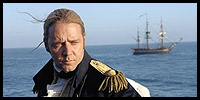
 |
|
Master and Commander: Cast: Russell Crowe, Paul Bettany, Billy Boyd, James D'Arcy, Lee Ingleby, David Threlfall, Max Pirkis, Edward Woodall, Chris Larkin, Jack Randall, Max Benitz, Robert Pugh, Richard McCabe, Ian Mercer, Tony Dolan 2003 – 138 minutes Rated: Reviewed by Dustin Putman, November 15, 2003.  Based on the novels by Patrick O'Brian about the adventures and exploits of 19th century Navy Captain Jack Aubrey (Russell Crowe) and surgeon Stephen Maturin (Paul Bettany), the needlessly double-titled "Master and Commander: The Far Side of the World" is an epic seafaring adventure that looks glorious but becomes a chore to sit through. As a realistic account of a ship crew in the midst of a war, the film is certainly successful. There was obviously a great deal of research put into the authenticity of every aspect, from the design of the sets to the ins and outs of each job on the ship. However, as a rip-roaring adventure that captures one's attention from the first frame and doesn't let go, the picture falters enormously.
Based on the novels by Patrick O'Brian about the adventures and exploits of 19th century Navy Captain Jack Aubrey (Russell Crowe) and surgeon Stephen Maturin (Paul Bettany), the needlessly double-titled "Master and Commander: The Far Side of the World" is an epic seafaring adventure that looks glorious but becomes a chore to sit through. As a realistic account of a ship crew in the midst of a war, the film is certainly successful. There was obviously a great deal of research put into the authenticity of every aspect, from the design of the sets to the ins and outs of each job on the ship. However, as a rip-roaring adventure that captures one's attention from the first frame and doesn't let go, the picture falters enormously.
 The time is 1805, and while the ravages of the Napoleonic War is being felt between the French and English, Captain Jack Aubrey and his crew on the HMS Surprise have been sent to the East coast of Brazil to put a stop to the French privateer Acheron. While Aubrey has a firm, go-getter attitude, the work ethics of surgeon Stephen Maturin are notably more reserved. Their differences ultimately mesh well together, with Aubrey's yin to Maturin's yang, as they form a strong friendship and a shared passion for music. There is no doubt that the crew of the HMS Surprise will succeed at their mission, but in order to fight for their country they must risk losing their lives, not only to their human enemies but to the overwhelming powers of nature.
The time is 1805, and while the ravages of the Napoleonic War is being felt between the French and English, Captain Jack Aubrey and his crew on the HMS Surprise have been sent to the East coast of Brazil to put a stop to the French privateer Acheron. While Aubrey has a firm, go-getter attitude, the work ethics of surgeon Stephen Maturin are notably more reserved. Their differences ultimately mesh well together, with Aubrey's yin to Maturin's yang, as they form a strong friendship and a shared passion for music. There is no doubt that the crew of the HMS Surprise will succeed at their mission, but in order to fight for their country they must risk losing their lives, not only to their human enemies but to the overwhelming powers of nature.
 Directed by Peter Weir (1998's "The Truman Show"), "Master and Commander: The Far Side of the World" is ambitious in its visual scope, but less so when it comes to its narrative and characters. The story is a simple one that lacks movement and complexity. Even at 138 minutes, dishearteningly little actually occurs, and while there is something of a solution at the end, it concludes on an empty, unsatisfying note. There is a small battle at the beginning, a violent storm soon after, and a larger, albeit anticlimactic, showdown at the end, the collective screen time of these three action sequences totaling roughly 30 minutes. The remaining two hours is padded out with lots of talking that doesn't mean much and half-hearted, one-note attempts at character-building. The film's languid pacing quickly grows tedious, and the movie itself, unfortunately, becomes a bore.
Directed by Peter Weir (1998's "The Truman Show"), "Master and Commander: The Far Side of the World" is ambitious in its visual scope, but less so when it comes to its narrative and characters. The story is a simple one that lacks movement and complexity. Even at 138 minutes, dishearteningly little actually occurs, and while there is something of a solution at the end, it concludes on an empty, unsatisfying note. There is a small battle at the beginning, a violent storm soon after, and a larger, albeit anticlimactic, showdown at the end, the collective screen time of these three action sequences totaling roughly 30 minutes. The remaining two hours is padded out with lots of talking that doesn't mean much and half-hearted, one-note attempts at character-building. The film's languid pacing quickly grows tedious, and the movie itself, unfortunately, becomes a bore.
 Fault most definitely cannot go to the production design by William Sandell (2000's "The Perfect Storm"), authentically replicating both the internal and external of an early-19th century ship, and the gorgeously atmospheric, perpetually gloomy cinematography by Russell Boyd (2001's "American Outlaws"). Some scenes might have benefitted from the use of long shots to widen its scope, but overall, the movie is an aesthetic dream.
Fault most definitely cannot go to the production design by William Sandell (2000's "The Perfect Storm"), authentically replicating both the internal and external of an early-19th century ship, and the gorgeously atmospheric, perpetually gloomy cinematography by Russell Boyd (2001's "American Outlaws"). Some scenes might have benefitted from the use of long shots to widen its scope, but overall, the movie is an aesthetic dream.
 Too bad, then, that all of the impressive work on capturing the visuals wasn't put to use within a stronger story. The film is all fits and stops, occasionally jumping to life for a few minutes before settling back down for another thirty minutes of weak, patience-testing exposition. The climactic raid of the Acheron pulses with energy and high stakes, but the storm sequence plays like an afterthought, an inferior version of "The Perfect Storm" with no follow-through. Coincidentally, and perhaps tellingly, the best scenes, including the unexpected, haunting suicide of a midshipman, and a lovely segment set on the luscious Galapagos Islands, have nothing to do with the heart of the premise.
Too bad, then, that all of the impressive work on capturing the visuals wasn't put to use within a stronger story. The film is all fits and stops, occasionally jumping to life for a few minutes before settling back down for another thirty minutes of weak, patience-testing exposition. The climactic raid of the Acheron pulses with energy and high stakes, but the storm sequence plays like an afterthought, an inferior version of "The Perfect Storm" with no follow-through. Coincidentally, and perhaps tellingly, the best scenes, including the unexpected, haunting suicide of a midshipman, and a lovely segment set on the luscious Galapagos Islands, have nothing to do with the heart of the premise.
 As a performer, Russell Crowe (2001's "Gladiator") can do no wrong. He is an acting chameleon who transforms into every character he plays, and injects his performances with an intensity and humanity only equaled by Hollywood's greats. As ultra-fine as Crowe is, such as in a quiet scene where he gives a book to wounded 13-year-old midshipman Blakeney (Max Pirkis), he cannot overcome the threadbare screenplay and its depiction of the relationship between Aubrey and Maturin. Their bond is meant to be the human focal point, but it is sorely underdeveloped. As the brave but frightened Blakeney, young newcomer Max Pirkis avoids every temptation to mug for the camera, giving an understated, effective supporting performance. The rest of the main cast make no impression at all, fighting an uphill battle to bring depth to roles that simply aren't there on the written page. It is supposed to be tragic when some of them perish at the end, but it isn't because we have made no real connection with them.
As a performer, Russell Crowe (2001's "Gladiator") can do no wrong. He is an acting chameleon who transforms into every character he plays, and injects his performances with an intensity and humanity only equaled by Hollywood's greats. As ultra-fine as Crowe is, such as in a quiet scene where he gives a book to wounded 13-year-old midshipman Blakeney (Max Pirkis), he cannot overcome the threadbare screenplay and its depiction of the relationship between Aubrey and Maturin. Their bond is meant to be the human focal point, but it is sorely underdeveloped. As the brave but frightened Blakeney, young newcomer Max Pirkis avoids every temptation to mug for the camera, giving an understated, effective supporting performance. The rest of the main cast make no impression at all, fighting an uphill battle to bring depth to roles that simply aren't there on the written page. It is supposed to be tragic when some of them perish at the end, but it isn't because we have made no real connection with them.
 Those interested in the experiences of 19th century nautical officers and warfare may be able to wade through the many slow spots in "Master and Commander: The Far Side of the World" and have an absorbing time at the movies. Everyone else, including those expecting a thrill-a-minute adventure from the misleading trailers and television ads, would be best to look elsewhere. A small-minded, slow-moving, uneven motion picture with a huge budget of $120 million, with the end credits arises the very valid question of whether all the money it took to make this was really worth it. Nay.
Those interested in the experiences of 19th century nautical officers and warfare may be able to wade through the many slow spots in "Master and Commander: The Far Side of the World" and have an absorbing time at the movies. Everyone else, including those expecting a thrill-a-minute adventure from the misleading trailers and television ads, would be best to look elsewhere. A small-minded, slow-moving, uneven motion picture with a huge budget of $120 million, with the end credits arises the very valid question of whether all the money it took to make this was really worth it. Nay.
|
© 2003 by Dustin Putman |














